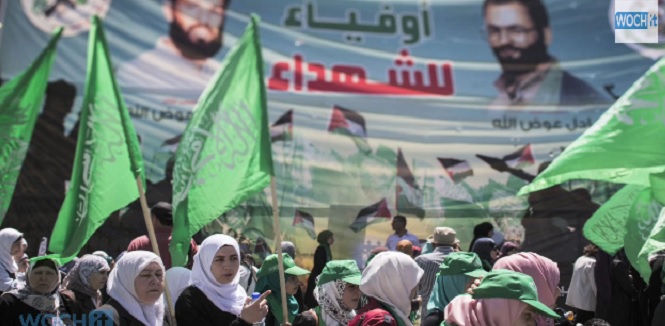Emerging worries that a unity agreement between the rival Palestinian Fatah and Hamas factions would provide the latter with a badly needed lifeline seemed set to deepen on Friday, with multiple reports being published indicating that the Iran-backed terror group was surging in the Fatah-controlled West Bank.
Hamas was reported as making inroads into Ramallah – from which Fatah governs its West Bank territories – as measured by “the amount of Hamas flags that are being waved in PA controlled areas.”
The Times of Israel also reported on the use of Hamas flags at Palestinian event:
Participants in a Palestinian wedding procession which took place in Jerusalem’s Old City on Thursday with police authorization displayed the flags of Hezbollah, Hamas and al-Qaeda alongside those of Palestine, Walla news reported.
According to the report the crowd also chanted anti-Israeli slogans as it passed through the streets.
Local resident Sarit Applebaum told the news website that such incidents were becoming increasingly common.
The news comes a few days after reports emerged that Hamas had held a large-scale demonstration in the West Bank, which Israeli outlets described as a “massive show of force.” That rally had already reinforced suspicions – outlined at length on Monday by veteran Israeli journalist Avi Issacharoff – that Hamas was maneuvering to use the unity agreement to boost its status:
In the last few days, Hamas’s motives — in what superficially appears to be a capitulation to Fatah’s demands in reconciliation talks — have become clearer. For Israel, these motives are perhaps an even greater cause for concern than the reconciliation itself.
This latest Fatah-Hamas, it would appear, is not a political or tacticalmaneuver by the Islamist organization. Rather, it is a sophisticated strategic move involving quite a large gamble, taken with an understanding of the new reality of the Middle East. The gamble shows that Hamas understands that it can no longer rule the Gaza Strip on its own, and so has decided to give up the comforts of government – even if temporarily – in order to win over Palestinian public opinion. Eventually, it could win the parliamentary, and possibly even the presidential, elections and gain overall Palestinian primacy.
Hamas’s command and control infrastructure, as well as huge swaths of its advanced arsenal, had been severely degraded during an eight-day Israeli air campaign in November 2012 that came in response to a sharp escalation in the amount and sophistication of projectiles that the group was using to target Israeli civilians and soldiers.
Less than a year later, in the aftermath of the ouster of Egypt’s Muslim Brotherhood-linked then-president Mohammed Morsi, the Egyptian army undertook a systematic campaign to destroy the smuggling tunnels that linked the Hamas-controlled Gaza Strip to the Sinai Peninsula and which served as Hamas’s economic channel to the outside world.
By October of last year, Hamas officials were publicly bemoaning that they had been “sentenced to death,” and by February 2014 analysts were predicting that Hamas was facing “a very bad year.” Subsequent months seemed in line with those assessments, with Hamas diplomatically isolated and seemingly caught in a downward economic spiral.
[Photo: WochitGeneralNews / YouTube]




